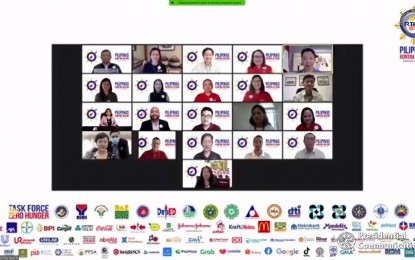
PILIPINAS KONTRA GUTOM. The private sector and other multisectoral groups alongside members of Task Force Zero Hunger share pro-active measures to uplift at least one million Filipinos from hunger by 2022 during the virtual media launch of the Pilipinas Kontra Gutom (PKG) movement on Monday (Feb. 23, 2021). They also vowed to work together on pushing various programs and sustainable initiatives with a common goal to reach zero hunger in the country in 2030. (Screengrab)
MANILA – Various private companies have promised to proactively support the government efforts as they stepped up endeavors to help address involuntary hunger and malnutrition in the country.
This commitment was made as the government, through the Task Force Zero Hunger and alongside its partners in the private sector and other non-profit organizations, launched the "Pilipinas Kontra Gutom" (PKG), a multi-sectoral anti-hunger initiative, which aimed at addressing involuntary hunger and food security in the Philippines on Monday.
Margot Torres, private sector lead for the PKG movement, said the private sector has responded to the government's call for joint initiatives to end malnutrition and hunger being experienced by some Filipinos in different parts of the country.
Torres said the private sector has translated the "key responsibility areas" of the National Food Policy into frameworks that can serve as a "springboard" for synergized initiatives and communication to end hunger issues among Filipinos.
She said the PKG movement will be functional into four "A" frameworks:
--Availability relates to food production by improving the productivity and income of the farmers and fisherfolk. It will also ensure a resilient food system.
--Accessibility relates to distribution as well as ensuring 100 percent access to safe, nutritious, and sufficient food year-round.
--Adequacy addresses hidden hunger with the vision of ending malnutrition experienced by children under five years old as well as pregnant women and lactating mothers.
--Assistance that addresses hunger and ensures a resilient food system during crisis periods such as the current pandemic or natural disasters.
"While the long-term goal is to end hunger by 2030, we have set an immediate realistic goal of uplifting one million Filipinos from hunger and malnutrition by 2022," Torres said.
She said the PKG programs will be pushed through in the priority areas with the highest poverty and malnutrition incidence.
The Task Force Zero Hunger has identified 32 priority areas while the private sector has identified 17 more areas in 49 provinces nationwide.
"As the multisectoral collaboration continues, we have mapped out where in the Philippines there are existing programs to guide us in synergizing our efforts for both the present as well as the future," she said.
Torres said they are targeting to include the public and partake in the PKG movement as she invited them to join the "Lahat kasali, lahat kasalo" initiative.
"We are preparing a consumer campaign and this will really invite the public to also participate even as low as 20 or 25 pesos to feed a hungry child so we're in the works,” she said.
Torres noted that the campaign is set to be launched by April this year.
Zero hunger movement
Meanwhile, Task Force Zero Hunger chairperson and Cabinet Secretary Karlo Nograles said resolving issues on involuntary hunger in the country is a "collective responsibility" among the general public, the government, and the private sector.
"[It is] an imperative for all of us—the government needs the help of the private sector and other stakeholders to achieve our shared goals for zero hunger in the country," he said.
Under the national food policy, Nograles said various programs and projects are lined-up to assist the food producers to sustain their livelihoods.
The PKG movement also targets to achieve zero undernourished Filipino children by 2030 with the involvement of promoting breastfeeding and providing nutritious meals for every household.
The private companies involve are Aboitiz, AXA, Bayer, Bank of the Philippine Islands, Cargill, Century Pacific Food, Inc., Coca-Cola, East-West Seed, Dole Philippines, Harbest, JG Summit Holdings Inc., Johnson & Johnson Philippines, Jollibee Foods Corporation, Kraft Heinz, McDonald’s Philippines, Mega Global Corp. Metrobank, Mondelez, Nestlé Philippines, NutriAsia, Pilmico Foods Corporation, RFM Corporation, San Miguel Corporation, SM Supermalls, Unilever Philippines, Universal Robina Corporation (URC), Unilab, and Vitarich.
While organizations and industry associations have joined the movement are AGREA, Go Negosyo, League of Corporation Foundations, Philippine Business for Social Progress (PBSP), Philippine Disaster Resilience Foundation (PDRF), Philippine Partnership for Sustainable Agriculture (PPSA), Scaling Up Nutrition, Supply Chain Management Association of the Philippines (SCMAP), and UN Global Compact.
Among the non-government organizations and foundations that have joined the movement are ABS-CBN Lingkod Kapamilya Foundation, Aboitiz Foundation, Ayala Foundation, Caritas, Gawad Kalinga, GMA Kapuso Foundation, Jollibee Group Foundation, Kabisig ng Kalahi, Manila Water Foundation, Metrobank Foundation, Pilipinas Shell Foundation, Project PEARLS, Rise Against Hunger Philippines, and Ronald McDonald House Charities.
PKG's digital and media partners, on the other hand, include Cobena Business Analytics and Strategy, Inc. Grab Philippines, GCash, PayMaya, Lazada, Shopee, Facebook, Google, TikTok, ABS-CBN, GMA Network, Business World, Manila Bulletin, Philippine Star, Kapisanan ng mga Brodkaster ng Pilipinas (KBP) and IKOT.PH.
Since the anti-hunger initiative was launched in November last year, the PKG has been grown into a movement and joined by around 70 partners from private companies, non-profit groups, and various organizations. (PNA)
